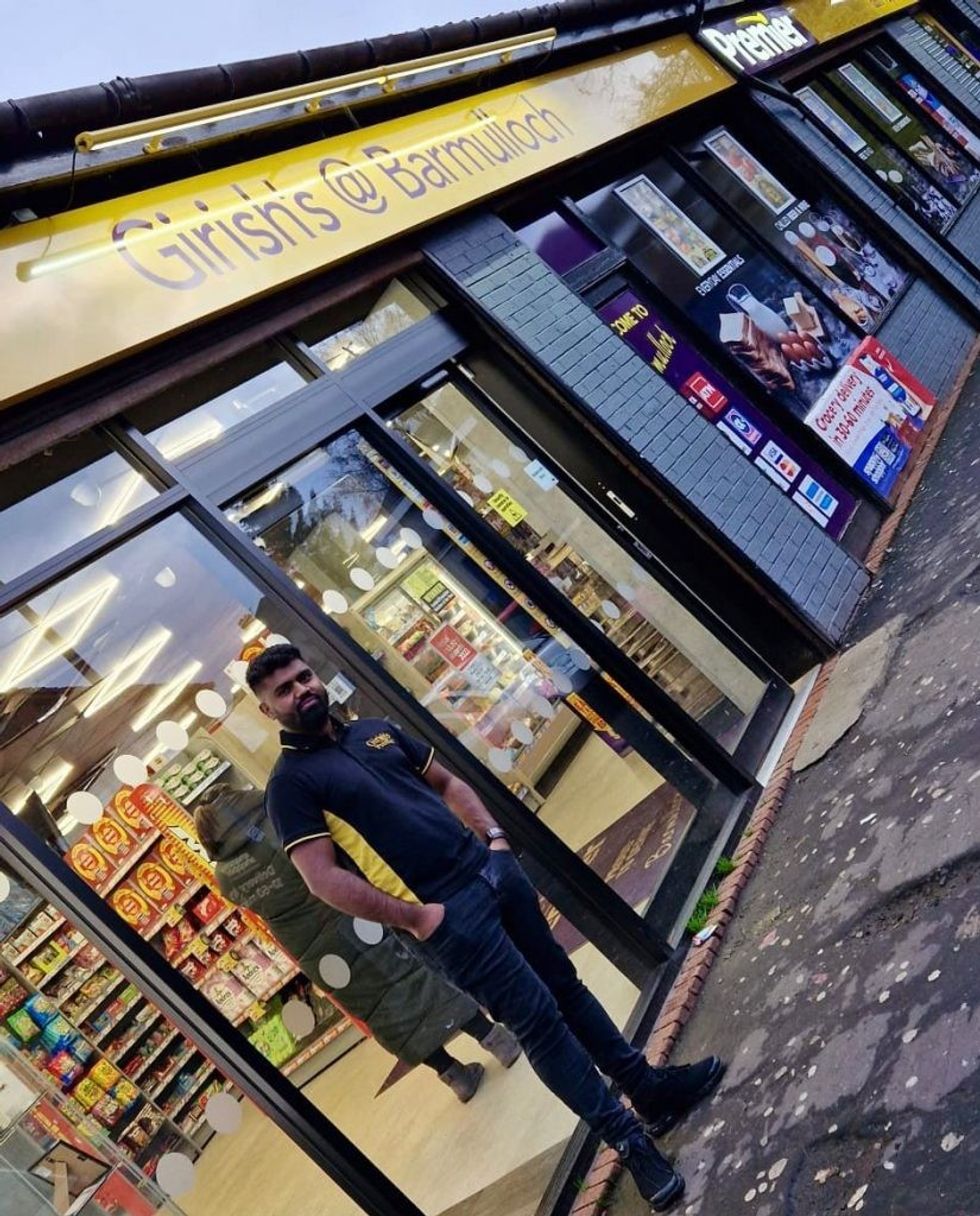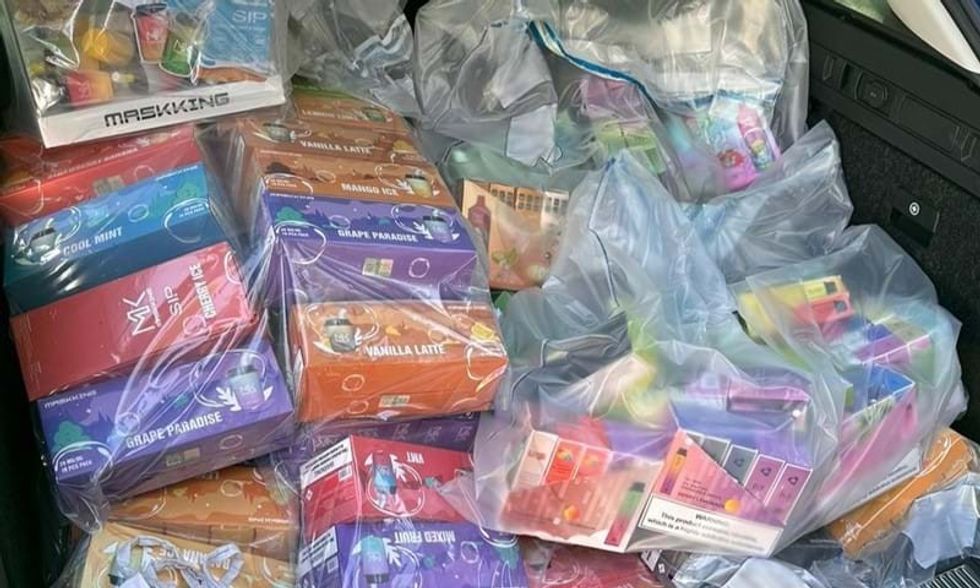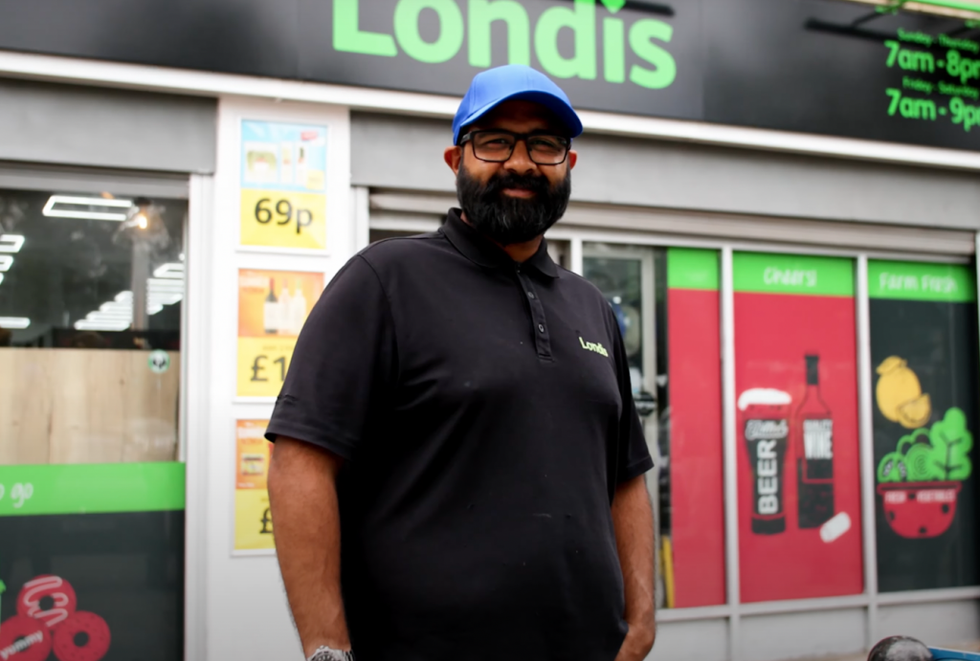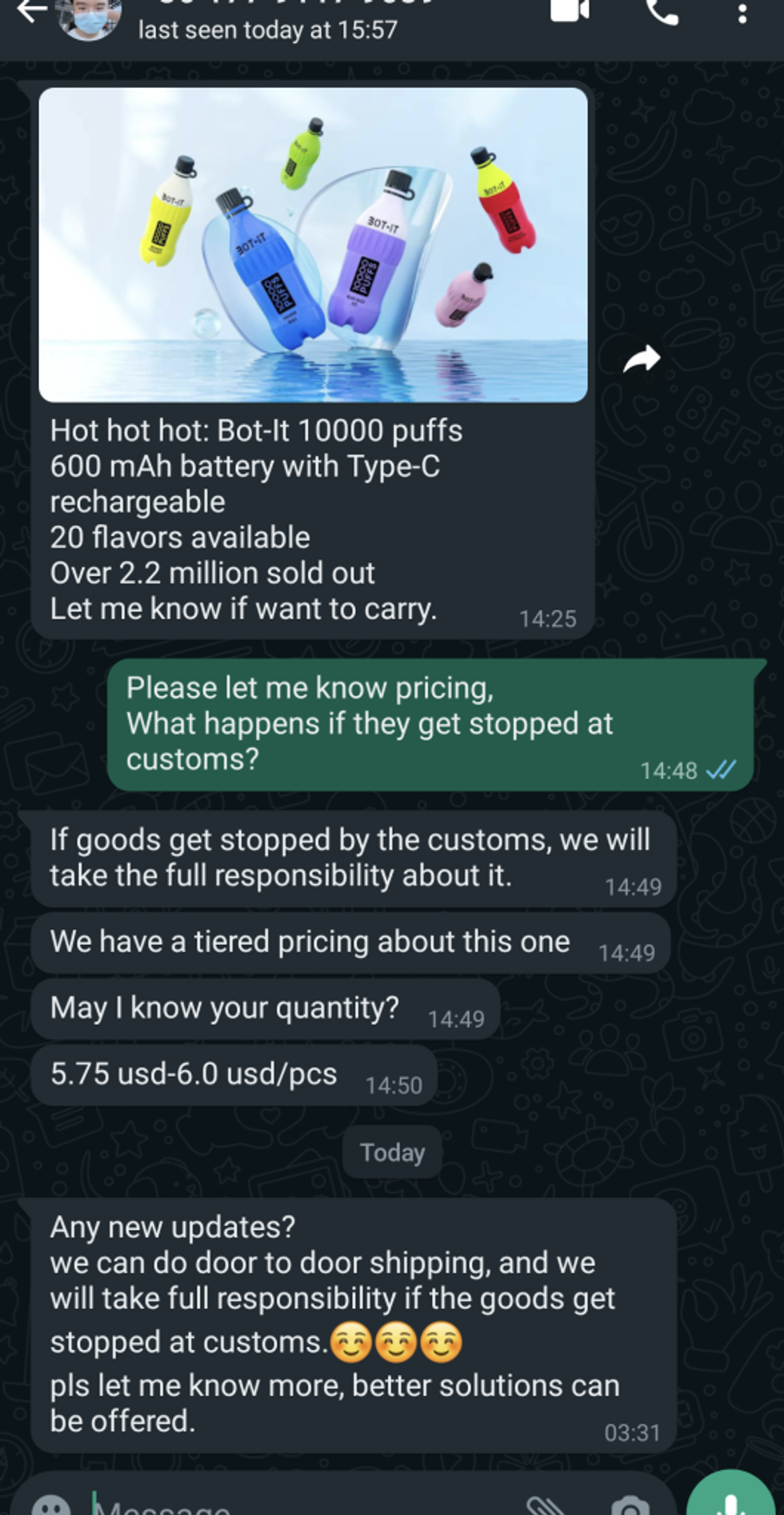The UK government's ban on disposable vapes won't fix anything but will only boost a surge in illegal products, thereby making matters worse- both in terms of youth vaping and irresponsible disposal, echo the chorus voices from academia, industry and convenience sector.
The government announced on Jan 29 that disposable vapes will be banned across the UK and more measures will soon be introduced to prevent vapes being marketed to children and teens.
It is already illegal to sell vapes to anyone under 18, but disposable vapes - which are often sold in smaller, more colourful packaging than refillable ones- are the "key driver behind the alarming rise in youth vaping", according to the government.
While prime minister Rishi Sunak’s determination to crackdown on youth vaping is commendable, he seems to have overlooked the role of disposable vapes as smoking cessation. He also appears to have ignored other alternative way outs and factors such as more stringent enforcement of current guidelines, licensing, education and better awareness and most importantly, tackling the already-thriving black market of illegal disposable vapes.
Convenience store owners are certainly not happy with this outright ban as it directly slashes their revenue.
Dartford-based retailer Nishi Patel, who runs the Londis Bexley Park store, feels that the ban is a “massive misstep and will make the black market bigger”.
“Retailers in general are having a tough time and are trying to find a balance with price increases and margin. A lot of retailers have only kept open due to vapes so it’s a huge blow to our industry. Some shops will have to stop trading because now they just can’t afford to stay open.
“Rather than actually doing some real legislation and policing it better they have basically made it look like we are all selling to underage, which a lot of us know isn’t the case. Everyone I know who’s a retailer is responsively doing their trade across the board,” he said.
There has been a general cross-party as well as vaping industry consensus that there needs to be increased regulations and licensing on the vaping industry. There were talks of fit-for-purpose licensing scheme and for £10,000 on-the-spot fines for retailers caught selling illicit and non-compliant products or indulging in underage sales.
Patel also questioned the government’s decision of not considering the above-mentioned proposals prior to the ban, saying, “responsible retailers should be allowed to do what our fathers have been doing for years”.
Llanidloes-based retailer Trudy Davies of Woosnam and Davies News in Wales, who is also the district president for all the West Midlands branches of The Federation of Independent Retailers, has been keeping a vape recycling bin in her store since months, much before it became a guideline.
Calling the government decision “disappointing and draconian”, she estimates that seven percent of sales of her store will be impacted.
"Many retailers will have to cut staff plus a lot of them will be put ‘on hold’. We, as retailers, put back profits into investing or making our stores safe for a secure for future growth. This decision on disposable vapes will be devastating for retailers.
“This is a knee jerk reaction from a government during an election year. Most of the sector has asked from the very first for track and trace (like tobacco) and even suggested plain packaging (again like tobacco) but to give a blanket ban will make it not at all difficult but easy for the ones that don’t comply,” Davies told Asian Trader.
“Sadly, the retailers who will be affected will be the ones who are already taking care of all the regulations as well as not making any underage sales. Counterfeit black marketers and internet sellers will carry on regardless and are probably at this very moment rubbing their hands together,” she said.
Owner of Girish's Premier store in Barmulloch in Glasgow, retailer Girish Jeeva asserted that the ban will have a huge impact on sales and overall business, making it more difficult for him to pay bills along with other rising costs such as rise in national minimum wage again in April.
“Our weekly sales are £9,500-10,000 a week on vapes. Losing £10,000 worth of sales will impact us badly,” he said.
Well-versed with age regulations in vapes, Jeeva only sticks to top brands that are being supplied by Booker. Other than Booker, he procures his stock only from renowned wholesalers like Magnum vapes, a local vape supplier that not only deals in legal certified products but also advises retailers on regulations and legalities.
“As a retailer I think the government is just making the situation worse by allowing the black market and illegal trades to take place. It is almost as if they are opening the doors for them,” he told Asian Trader.

Industry experts are also pointing out that rules to combat youth vaping as well as littering were already in place. It was only a matter of better enforcement and educating the youth.
“There are rules already in place to stop children purchasing vapes, to stop vapes being littered and ensure they can be recycled, and to punish those who sell illicit products but they are either not being enforced effectively or not at all due to a lack of resources provided to trading standards.
“The government’s proposals will have a significant operational and financial impact on legitimate retailers, while rogue sellers will continue on without concern,” ACS chief James Lowman said.
Federation of the Independent Retailers also states that the ban will boost sale of illegal vaping products.
“An outright ban will simply send youngsters towards unorthodox and illicit sources where there is no compliance to tobacco and vaping laws, while the products they peddle are likely to contain dangerous and illegal levels of toxic chemicals,” Muntazir Dipoti, the National President of the Federation of the Independent Retailers (the Fed), said.
To clamp down on young people vaping, the government needs to make more financial resources available for educational campaigns, while more enforcement activity is required, especially at borders to prevent counterfeit products entering the market, Dipoti added.
Cloud of Contrabands
Does government really believe that such a ban will make disposable vapes disappear from the UK?
Calling the ban a “counterproductive legislation”, UK Vaping Industry Association (UKVIA) states that the ban “hands the regulated vaping market to criminals on a silver platter”.
Independent British Vape Trade Association (IBVTA) also feels that the ban will simply benefit those pushing illegal and unregulated product as people seek out single-use and flavoured products from illicit sources.
As lamented by retailers and industry bodies, this ban is more of a blatant boost to the thriving black market, a market which is already overflowing with millions of illegal and counterfeit products, a Gordian knot that the authorities have been miserably failing to untangle.
Prior to the January ban, sale of disposable vapes with tanks that contain more than 2ml of e-liquid if they contain nicotine, which comes to be around - around 600 puffs- was already prohibited. However, it is a known fact that the UK high streets are filled with disposable vapes with much higher puff levels.

Millions of illegal and potentially harmful vapes have been seized by trading standards in the last three years, data shows, with experts warning this is just the “tip of the iceberg” of “tsunami” of products flooding in the UK.
Freedom of information requests to 125 local authorities revealed in June last year that more than two and a half million illicit e-cigarettes were collected since the beginning of 2020.
The number of illegally imported vapes seized at the UK border quadrupled in the last year as latest data show more than 4.5 million vapes were seized by the UK Border Force between January and October last year. Just 4,430 vapes were seized in 2021, rising to 988,064 in 2022, and soaring to 4,537,689 in 2023.
Since most hauls of illegal vape end up in the black market and eventually with end-users, the numbers of products seized by Trading Standards paint a grim picture.
According to Trading Standards, this “tsunami” of illegal products is coming from China.
“Almost all of the illegal disposable vapes are being imported into the UK and most of them appear to be coming from China. They come via air, sea, courier and even by post and we have recently strengthened enforcement at all ports and borders to tackle,” a Trading Standards spokesperson told Asian Trader.
Counterfeit products ultimately reach rouge retailers. And it is not just some rogue c-stores that are involved in here, many of such products are sold from barber shops, ice cream shops and souvenir stores.
Trading Standard cited lack of resources, lack of storage for seized goods, hostility against officers, the number of varied businesses selling these products and the demand for illegal disposable vapes as some of the challenges that it is facing to tackle this problem.
In fact, a new breed of e-cigarette that addicted teenagers and confounded regulators worldwide by offering flavors like Blue Cotton Candy and Pink Lemonade in a cheap, disposable package, originates in the southern manufacturing hub of Shenzhen in China.
The makers behind such products are infamous for flouting rules in US and flooding its market with flavoured vapes. With an outright ban coming in the picture in the UK, it is highly obvious that such makers and sellers are going to pump-up their supply.
Additionally, social media is filled with counterfeit products. Almost every convenience retailer gets bombarded with messages from random companies and individuals for buying a stock of their cheap illegal vapes. They are cheap, colorful, have more puffs (imagine £50 for 5 per cent nicotine and 4,000 puffs), fancy flavours and easily available at just a click.
Acknowledging the huge role of social media, Trading Standards said, “The Advertising Standards Agency are investigating advertising on social media platforms and will take action against anyone promoting vaping products there.
Stating that it is actively carrying out enforcement in this area, Trading Standard strongly advised shop owners to keep on top of any changes by checking the CTSI Business Companion site where information will be added as soon as clarity is available on the legislation.
Bodies like IBVTA and ACS have also been warning retailers not to procure products from uncertified sources and consider if the supplier is a legitimate business “registered with Companies House and has a valid VAT number”.
A Disastrous Move
Interestingly, an outright ban on disposable vapes will hamper the most to small convenience stores while industrial giants will remain unaffected.
Supreme PLC, the name behind some of the country’s top selling disposable vapes like Elf Bar and Bloody Mary, has in fact “welcomed” the government's decision. Considering the forecasts that disposables will contribute £9m FY24 on revenues of £75m, experts feel that Supreme’s FY25 outlook should remain largely unaffected by the ban while the incoming rules are predicted to cause a temporary spike of replacement vaping devices and refillable kits.
As the buyers will transition to refillable vaping or back to cigarettes, it is a blatant truth that they will also be lured aggressively towards counterfeit, under-the-counter, cheaper and illegal disposables.
Considering that 5 million single use vapes are being thrown away in the UK every week, a fourfold increase from 2022, the problem of littering, even after the ban, will also continue to exist.
Just a few weeks ago, the Association of Convenience Stores (ACS) launched new guidance for retailers under which all retailers who sell vapes (regardless of type) must provide a recycling facility for consumers to bring back used or unwanted vapes. As part of the rules, retailers must also make information available to customers about the vape recycling service they offer.
Now that disposable vape market is set to go completely underground, it is a joke to believe that black marketers and rogue sellers will drive recycling campaigns the way responsible convenience retailers would have done collectively.
A more effective way to tackle youth vaping is by attacking the root of the problem and that is rogue traders- both sellers and suppliers. Also, the key lies in educating the teens and campaigning about the harmful effects.
This knee jerk reaction by Sunak’s government and that too just a few months before the election is being called out as short-sighted decision, a recipe for disaster that won't solve a thing but will only make matters worse, adding more problems to the pile.









